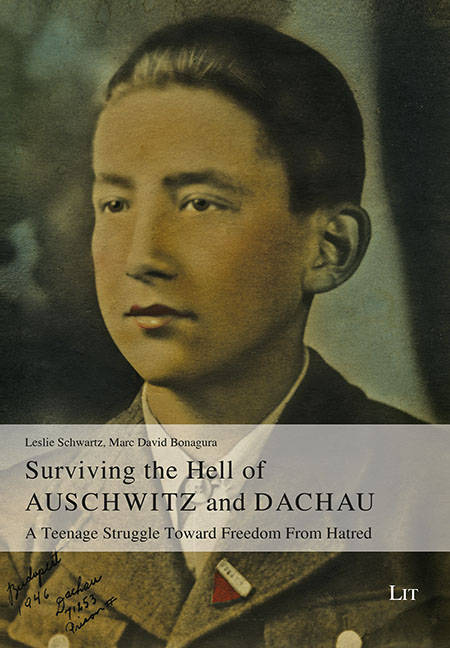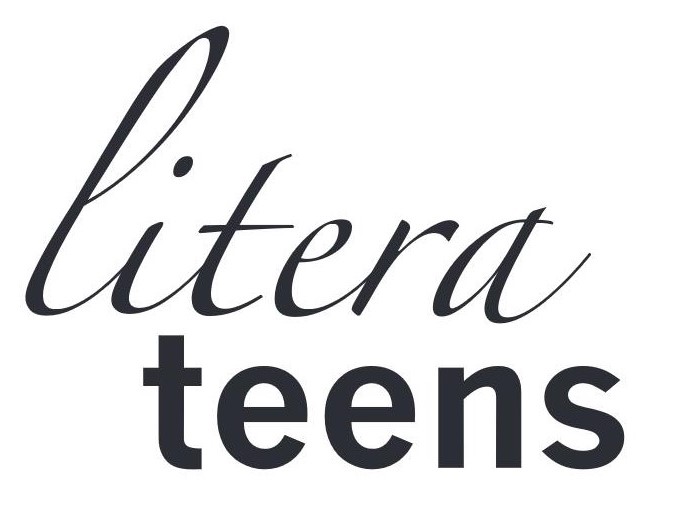„Surviving the Hell of Auschwitz and Dachau - A Teenage Struggle Toward Freedom From Hatred“ (englisch)
rezensiert von Flora Wiegand, 12. Klasse Lichtenbergschule, Darmstadt

Leslie Schwartz is one of the most impressing people I have met so far. He was an old man of 83 years, shaped by his life experience of surviving the Holocaust, when I first met him this spring. But when he talks and writes about his stolen youth he can transport a whole auditorium to the happy times of his childhood in Baktaloranthaza, Hungary, and back to the humiliation and struggle during his imprisonment in Auschwitz and Dachau. Nevertheless, his matter-of-fact voice can also stress the importance of why the past events of discrimination, racism and the resulting humiliation should never be repeated and how important we, the future generation, are on this mission.
Despite his age he has an unstoppable enthusiasm and energy to speak to as many German teenagers as possible. Teenagers of a country that he wanted to leave for good over 60 years ago, but after years of denial, he has already talked at over 200 schools only this year.
He also documented his story in his autobiography „Surviving the hell of Auschwitz and Dachau – A teenage struggle towards freedom from hatred“, a cooperation with Marc David Bonagura, which was originally published in German and Danish language in 2010, while a revised English edition was released in 2013 by the Lit Verlag.
In his autobiography Lazlo „Leslie“ Schwartz, later called „Lazarus“, the resurrected, was born into a Jewish family on January 12, 1930 as the son of a salesman suffering from poliomyelitis in Baktaloranthaza, Hungary. With the death of his father, a man whose traditional upbringing made Leslie resistant to any physical or mental violence, also the Nazi-propaganda gained popularity in Hungary. Starting with a generally negative perception of the Jewish population, soon the Jewish school was closed in 1940. Leslie had to attend a catholic school where he was regarded as an outcast. While the family was still save in their local community, they eventually could only trust their closest neighbors in the months before their first deportation.
In total the Schwartz family was deported twice. During the first deportation, enduring several days in railway cattle cars without food, they were simply brought back home. Then it followed a second time when they were really deported. With a stop in the Ghetto of Kisvarda, the family was transported to Auschwitz. Having arrived in Birkenau, Leslie lost track of his family in the crowd after having been inspected by camp physician Dr. Joseph Mengele. It was the last time that Leslie would see his mother and sister.
With the aid of a friend back from his home town the 14-year old was able to escape onto a train heading to the work camp Dachau and hereby saved his own life. Over the years of his imprisonment Leslie Schwartz met several people, who, against all odds and dangers helped him. In early 1945 the Nazis ordered to destroy all evidences of their genocide program by extinguishing all, mostly jewish prisoners. After weeks on the so called „death marches“ the near to death worked Jews were forced to mount the „death trains“. Leslie Schwartz himself was on the „Mühldorfer Zug“, a train which was shot at several times by the allied forces before the prisoners tied the clothes of the dead on the roof. Only with the help of others, Leslie was able to survive the liberation in Poing only to be captured again and be once and for all liberated in Tutzing. To bridge the time till 1945 he was brought to a Displaced Persons Camp, before having first contact with unknown American relatives, who enabled his immigration.
Nevertheless, Leslie Schwartz’ 100 page long autobiography is not only a moving story. It is a story full of great courage, the unbendable will to survive in such hopeless times, the indestructible hope in a life after and in humanity – not only for those who treated him as an equal human being against all restrictions. He even disapproves those who simply gave up. Yet he also describes those who tortured him the worst simply as humans with faults and dreams – without thoughts of revenge.
Moreover, the book also lays open the fear and uncertainties of the young Leslie: „I needed to become insensitive and brutal to survive and hatred would be the best fuel to feed that process. [It was] the contradictory notion that we all needed to help each other to get through this trail – but would love truly hold more power than hate?“ Thus, it is not the story of a hero. It is a story of a real boy. It is the way Leslie Schwartz could forgive.
Today, the emotional and physical distress that Leslie Schwartz had to endure and suffer is unimaginable, but with his brutally honest, down-to-earth and simple words, the reader has the certainty that these are indeed Leslie Schwartz’ very own words to tell his story. Beyond that, the well-structured and easy to follow book, highlighted by selective family photos, is not only a story of the past, as the autobiography also documents his „healing process“: „The kindness and compassion I have experienced from the people of modern Germany have amazed me; their search for truth and wisdom is also my search. The missing parts of my soul have been gathered together. I am made whole“ (S. 83).
Despite all personal attachments that the author shares with the reader he maintains a certain distance to the happened events. Therefore, the autobiography leaves room for one’s own knowledge and reflection and open one’s understanding of history to a more individual and personal aspect of reflection.
All in all, I strongly recommend this autobiography to everyone who is willing to intensively face the persecution of Hungarian Jews and follow the life’s journey of a man, who once feared „that [Jews] would simply disappear and no one would ever know what had happened to [them]. But we have not been forgotten.“ Finally his revelation wish is: „My only wish now is for the world to know the peace and healing I have found.“ (S. 83).
On July 1, 2013 Leslie Schwartz was honored with the „Bundesverdienstkreuz“ in Munich.
geschrieben am: 15. Dezember 2015 unter der Betreuung von Margit Sachse



